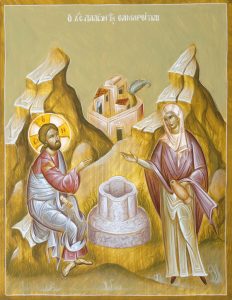 The theme of baptism continues in this Sunday’s Gospel, re-affirming that Pascha is a feast of resurrection and of baptism, being born into eternal life. The center of Jesus’ conversation with this unnamed woman (the Church later gave her the name Photine, the “enlightened woman”) is about water. They met at Jacob’s well, a place of great tradition, a sign and a promise of God’s love and mercy for his people. Jacob’s well provided the riches of water to a desert place, the sign that God would always provide for and bless his people. However, the encounter with the woman reveals something more: Jesus is the Messiah to come, he is greater than the Patriarch Jacob. The water of Jacob’s well is only for this world, Jesus would give “the water that would become a spring of water welling up to eternal life” (John 4:14). This clearly refers to our baptisms, as it comes immediately after the comparison of Jesus with John the Baptist, and the baptisms done by Jesus’ disciples. We renew our baptism every time we receive Communion, and they are for life, for eternal life, from God, the giver of life.
The theme of baptism continues in this Sunday’s Gospel, re-affirming that Pascha is a feast of resurrection and of baptism, being born into eternal life. The center of Jesus’ conversation with this unnamed woman (the Church later gave her the name Photine, the “enlightened woman”) is about water. They met at Jacob’s well, a place of great tradition, a sign and a promise of God’s love and mercy for his people. Jacob’s well provided the riches of water to a desert place, the sign that God would always provide for and bless his people. However, the encounter with the woman reveals something more: Jesus is the Messiah to come, he is greater than the Patriarch Jacob. The water of Jacob’s well is only for this world, Jesus would give “the water that would become a spring of water welling up to eternal life” (John 4:14). This clearly refers to our baptisms, as it comes immediately after the comparison of Jesus with John the Baptist, and the baptisms done by Jesus’ disciples. We renew our baptism every time we receive Communion, and they are for life, for eternal life, from God, the giver of life.
A couple of observations: as for Nathaniel, Jesus signs his ministry with intimate knowledge of the people he meets. He sees Nathaniel under the fig tree, and he tells the woman about her five husbands. In both cases, they become his disciple because of his knowledge of him. This is a theme of John’s Gospel, the shepherd knows his sheep and his sheep know him. Second, it should be to our wonder that Jesus always comes to the most underprivileged. To whom does he reveal the mystery of eternal life in baptism: to the paralytic who had no friends, to the woman who had led a shameful life, and came to the well at noon who no one else would be there, and to the blind man suspected of sin because of his blindness. And the disciples marvel that Jesus speaks to a woman! Not just any woman, but a heretical, decadent Samaritan woman! Are we humble enough to accept Jesus as our Messiah?
Meditation by Archpriest David Petras
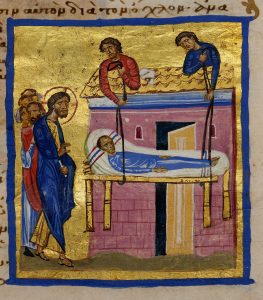 There are six Sundays in the forty day celebration of the Resurrection (corresponding to the forty days until the Ascension as recorded in the Gospel of Luke). The first three Sundays have a gospel of the Resurrection and the second three a gospel with a baptismal theme. Sadly, in our day the baptismal theme of the Feast of Pascha has sometimes been eclipsed, But Paul’s Letter to the Romans makes that connection: “Or are you unaware that we who were baptized into Christ Jesus were baptized into his death? We were indeed buried with him through baptism into death, so that, just as Christ was raised from the dead by the glory of the Father, we too might live in newness of life. (Romans 6:3-4)” This Sunday, we see this is the story of the Paralytic Man. He was without friends, paralyzed for thirty-eight years and unable to get into the pool when the angel touched the waters. However, he finds a friend in our Lord, who asks, “Do you want to be well?” This gospel affirms the sacramental mystery of baptism: it is not the water touched by an angel that cures the man, but the ultimate power of healing comes from the Lord, in the waters of baptism touched by the Holy Spirit sent by the Lord.
There are six Sundays in the forty day celebration of the Resurrection (corresponding to the forty days until the Ascension as recorded in the Gospel of Luke). The first three Sundays have a gospel of the Resurrection and the second three a gospel with a baptismal theme. Sadly, in our day the baptismal theme of the Feast of Pascha has sometimes been eclipsed, But Paul’s Letter to the Romans makes that connection: “Or are you unaware that we who were baptized into Christ Jesus were baptized into his death? We were indeed buried with him through baptism into death, so that, just as Christ was raised from the dead by the glory of the Father, we too might live in newness of life. (Romans 6:3-4)” This Sunday, we see this is the story of the Paralytic Man. He was without friends, paralyzed for thirty-eight years and unable to get into the pool when the angel touched the waters. However, he finds a friend in our Lord, who asks, “Do you want to be well?” This gospel affirms the sacramental mystery of baptism: it is not the water touched by an angel that cures the man, but the ultimate power of healing comes from the Lord, in the waters of baptism touched by the Holy Spirit sent by the Lord.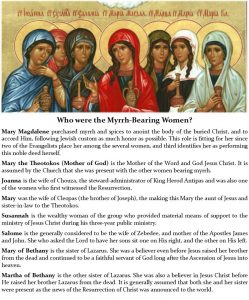
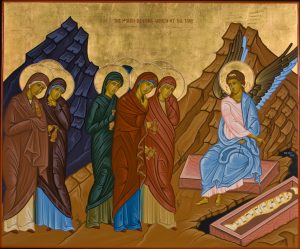 This Sunday presents us with the proclamation of the resurrection according to St. Mark.
This Sunday presents us with the proclamation of the resurrection according to St. Mark.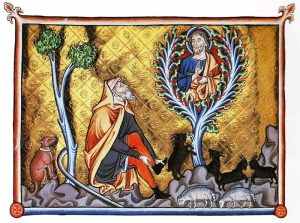 When God appeared to Moses, he first spoke to him from the burning bush. “There the angel of the Lord appeared to him as fire flaming out of a bush. When he looked, although the bush was on fire, it was not being consumed. So Moses decided, “I must turn aside to look at this remarkable sight. Why does the bush not burn up?” (Exodus 3:2-3). Later God was to tell Moses on Mount Sinai, “But you cannot see my face, for no one can see me and live” (Exodus 33:20). Indeed, the Epistle to the Hebrews declares, “our God is a consuming fire” (Hebrews 12:29).
When God appeared to Moses, he first spoke to him from the burning bush. “There the angel of the Lord appeared to him as fire flaming out of a bush. When he looked, although the bush was on fire, it was not being consumed. So Moses decided, “I must turn aside to look at this remarkable sight. Why does the bush not burn up?” (Exodus 3:2-3). Later God was to tell Moses on Mount Sinai, “But you cannot see my face, for no one can see me and live” (Exodus 33:20). Indeed, the Epistle to the Hebrews declares, “our God is a consuming fire” (Hebrews 12:29).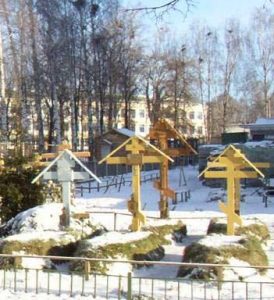 On the first free day after Bright Week [i.e., today], the Church traditionally remembers all those who have fallen asleep. Because of the hope of the resurrection, this is called the “
On the first free day after Bright Week [i.e., today], the Church traditionally remembers all those who have fallen asleep. Because of the hope of the resurrection, this is called the “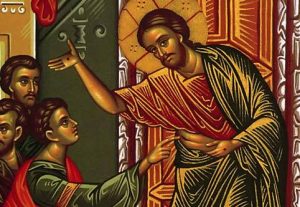 Every day during the week of Easter, called Bright Week by the Church, the paschal services are celebrated in all their splendor. The Easter baptismal procession is repeated daily. The royal gates of the sanctuary remain open. The joy of the Resurrection and the gift of the Kingdom of eternal life continue to abound. Then, at the end of the week, on Saturday evening, the second Sunday after Easter is celebrated in remembrance of the appearance of Christ to the Apostle Thomas “after eight days” (John 20.26).
Every day during the week of Easter, called Bright Week by the Church, the paschal services are celebrated in all their splendor. The Easter baptismal procession is repeated daily. The royal gates of the sanctuary remain open. The joy of the Resurrection and the gift of the Kingdom of eternal life continue to abound. Then, at the end of the week, on Saturday evening, the second Sunday after Easter is celebrated in remembrance of the appearance of Christ to the Apostle Thomas “after eight days” (John 20.26).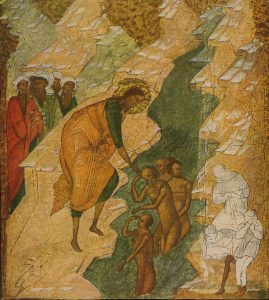 Today is the seventh day of Bright Week, the joyful celebration of the Resurrection of Christ. In today’s Apostolic Reading, St. Peter again proclaims, “The author of life you put to death, but God raised him from the dead; of this we are witnesses” (Acts 3:15). The gospel returns to the theme of baptism, for our life in Christ through the mystery of baptism is the beginning of our share in Christ’s eternal resurrection.
Today is the seventh day of Bright Week, the joyful celebration of the Resurrection of Christ. In today’s Apostolic Reading, St. Peter again proclaims, “The author of life you put to death, but God raised him from the dead; of this we are witnesses” (Acts 3:15). The gospel returns to the theme of baptism, for our life in Christ through the mystery of baptism is the beginning of our share in Christ’s eternal resurrection.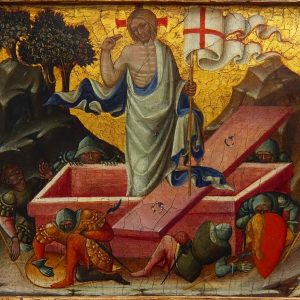 Hearing the story of the fearful passion of our Lord, one is struck by two things: he was opposed by the religious leaders of his people, and was branded as a blasphemer deserving of death. He was persecuted by the state for treason because he made himself a king. Jesus was rejected then by the powers-that-be just as he is rejected today by a world which worships only power and the hatred of the other. The disciples may have believed and loved Jesus, but they proved to be of no help, they ran for their lives. One denied him but then repented, another betrayed him and lost the gift of life. But! – look and see – what does God make of this wretched situation? He takes it and he turns it upside down, transforming it into a cosmic salvation of the world and the total destruction of death. It is as Isaiah prophesied: “For the Lord shall rise up as on Mount Perazim, be-stir himself as in the Valley of Gibeon, to carry out his work—strange his work! to perform his deed—alien his deed!” (Isaiah 28:21).
Hearing the story of the fearful passion of our Lord, one is struck by two things: he was opposed by the religious leaders of his people, and was branded as a blasphemer deserving of death. He was persecuted by the state for treason because he made himself a king. Jesus was rejected then by the powers-that-be just as he is rejected today by a world which worships only power and the hatred of the other. The disciples may have believed and loved Jesus, but they proved to be of no help, they ran for their lives. One denied him but then repented, another betrayed him and lost the gift of life. But! – look and see – what does God make of this wretched situation? He takes it and he turns it upside down, transforming it into a cosmic salvation of the world and the total destruction of death. It is as Isaiah prophesied: “For the Lord shall rise up as on Mount Perazim, be-stir himself as in the Valley of Gibeon, to carry out his work—strange his work! to perform his deed—alien his deed!” (Isaiah 28:21).